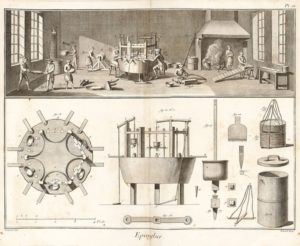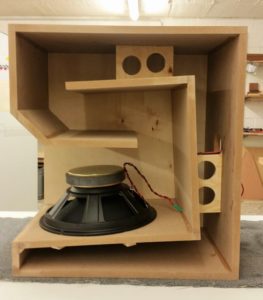Black Knowledge and Street Technology [SST Research 1.0]
The guiding principle of this research project is a recognition and respect for the scenes and the cultures that surround and fuel the SST themselves. We are researching a world that has been in operation long before this project was initiated and will continue long afterwards. One of the ways that the project can make a contribution to these scenes and the SST engineers and other professionals is simply by giving respect to what they do and what they know in order to design, build and maintain their SST.
The first step is to recognize what the engineers know as being a valuable kind of knowledge in itself, rather than simply dismissed as “know-how.” The project aims to use its “cultural capital” as an ERC funded research to help to do this. If the project is to make a contribution to “scientific” knowledge – which is a condition of the funding – then it has to start by recognising the kind of knowledge that underpins every SST scene. This is not to say that such knowledges – such as the engineering skills and techniques necessary to design, build and maintain a sound system – are readily recognised within the scenes themselves. Often, they are taken for granted. With Jamaican dancehalls, for instance, it is the MCs and selectors who garner the glory, rather than any audio engineers whose tuning of the set allow the performers to have a visceral impact on the crowd (dancehall audience).
The claim of the project is that the engineers’ embodied knowledge is a valuable resource for understanding how our relationship with technology – in the broadest general sense – can transformed to be of greater benefit to a greater number of people. This blog post begins this process by laying out some of the ideas that will be developed during the course of the project. Over the coming months my research team colleagues and myself will be adding posts under the six words that make up the project’s title and sub-title: Sonic, Street, Technologies, Diaspora, Culture, Knowledge. Here’s the first post on the last word.
A Provocation
Technology will save us, big tech tells us; others are more sceptical, offering low-tech solutions as less destructive of human life and the planet. Certainly, the technological transformation of substantial sections of humanity needs to be better understood. The claim here it that this understanding is already present amongst us, but is hardly recognised as such. As CLR James and Grace Lee put it:
In generations to come men will marvel at the almost pathological inability of educated society in the middle of the Twentieth [or this] Century to recognize the new society which surrounded it on all sides (1).
While the scenes surrounding sonic street technologies are neither a fully realised version of a new society, and far from the only example of such, they make an auspicious starting point to explore some of the ways in which technologies can help afford alternative socialities. Indeed, many SST make their link to community activism quite explicit, as with El Gran Latido in Colombia or Kebra Ethiopia in South Africa, as just two examples (2).

British Telecom poster on London Underground, 2020.
There are however major barriers to break down before the convivial understanding of technology found in SST can gain wider recognition and acceptance. Foremost is where this SST are to be found. This is in the ghettos, favelas and shanty towns and other marginalised communities in the form of sound systems, sonideros, picos and aparelhagem, for instance. The prejudice against the bearers of this knowledge, that is the denizens of these marginalised communities, often runs very deep – notably from the middle classes across the Global South. I well remember a Professor of Engineering at a University in Sao Paulo, Brazil, telling me after a talk I’d given there that it was simply impossible for the local aparelhagem engineers to have any rational understanding of what they were doing.

Technology, India, water pump re-purposed as tractor engine.
Even more important than the location of these “street” technologies is the actual nature of the knowledge – or more specifically, the ways-of-knowing – that underpin the invention of these technologies. The kind of knowledge used to engineer these street technologies is situated, embodied and tacit; it is a craft knowledge often based on experimentation, trial and error, tinkering and repurposing. This is a very different way of knowing compared to textbook, epistemic or standard scientific knowledge. Indeed, street technological knowledge is entirely beyond the pale of what can be conventionally be accepted as any kind of knowledge at all.
While technology itself has been a consistent recipient of philosophical attention, non-epistemic knowledge systems have been relegated to anthropology (3). The reasons for what can be called this epistemological prejudice stem from the very roots of the modern science in the Enlightenment and stretch through colony and empire to the present period of platform and extractive capitalism.
Street technological knowledge is not so much overlooked or ignored, but rather actively excluded from the modern worldview. This is the Enlightenment inheritance that has given rise to contemporary technoscience and technoculture.

A page from Diderot and D’Alembert’s Encyclopedia,1751
Interestingly, prior to the French revolution of 1787 to 1799, the thinking that gave rise to the Enlightenment had an entirely catholic approach to knowledge systems. The famous work of this period was the Encyclopédie, edited by Denis Diderot and Jean le Rond D’Alembert and published between 1751 and 1772. The full title is Encyclopedia, or a Systematic Dictionary of the Sciences, Arts, and Crafts (Encyclopédie, ou dictionnaire raisonné des sciences, des arts et des métiers) – precisely including arts and crafts. What is more the aim of the encyclopaedists, as the leading philosophers of the day were called, was to spread knowledge amongst the general public (aided by copious illustrations) and to share it across national boundaries (4). In short, in this period the subsequently inviable barrier between science and craft did not pertain.
While these philosophic considerations might appear quite far removed from current SST practices, they can serve as an historical foothold from which to develop an inclusive understanding of knowledge that can embrace street technologies. This is one of the aims of the research project. Currently, such ways of thinking otherwise than the Western cannon have tended to be sealed off within the glass cases as the (most often looted) artefacts for museum exhibition. Or they appear as spurious “ancient knowledge” systems in ubiquitous post apocalypse scenarios. It is not without irony that often the only hope for the near totally decimated planet is found to lie, not with the elite who caused the destruction, but with the subaltern survivors, as with Danny Boyle’s 28 Days Later, or Cherie Dimaline’s The Marrow Thieves novel (5). In short, salvation is to be found amongst the banished and oppressed.

A folded horn bass speaker.
Capitalist and colonialist systems have always had ways of extracting value from these systems with recognising the source, “All they want is my voice” says Ma Rainey in August Wilson’s play “They don’t care nothing about me” (6). At the very least this is a missed opportunity. But the stakes are very considerably higher than that. What have been to some extent tolerated as sub-cultures, in the face of the new normal of global “crises” – ecological, climatic, political – are all too readily deemed sub-human.
Historically this denial of reason to anyone other than Europeans has resulted in the genocides that were invariably required instrument for colonial expansion, initiated in Europe with the Crusades. This is the very challenging story that Raul Peck tells in his documentary series Exterminate All the Brutes; his title being the last line of Joseph Conrad’s novel of 1899, Heart of Darkness (7). Since Descartes, for the Western tradition, it has been knowledge, rationality and thinking that distinguishes the human from the animal. Robbing us of this faculty is a sure and certain step to perdition.
—
References:
(1) James, C L R and Lee, Grace C. Facing Reality: The New Society… Where to Look for It & How to Bring It Closer. Detroit: Charles Kerr, 1958/ 2006: 83.
(2) See SSO #7, Sound Systems at the Crossroads – The Sonic Challenge: Post Pandemic Sound System Practicies, 9th July 2021, https://www.youtube.com/watch?v=oY7ear2Zok0
(3) To name a few key texts: Heidegger, Martin. The Question Concerning Technology and Other Essays, trans and intro William Lovitt. New York: Harper Torchbooks,1954 / 1977; Simondon, Gilbert. On the Mode of Existence of Technical Objects. Trans. Cecile Malaspina and John Rogove. Minneapolis: University of Minnesota Press, 1958/ 2017; Stiegler, Bernard. Technics and Time, 1: The Fault of Epimetheus. Stanford: Stanford University Press, 1998; Ellul, Jacques. The Technological Society. New York: Random House, 1973; Giedion, Siegfried. Mechanization Takes Command: a Contribution to Anonymous History, Oxford: Oxford University Press, 1948.
(4) See Featherstone, Mike, Venn, Couze. Problematizing Global Knowledge and the New Encyclopaedia Project: An Introduction. Theory, Culture & Society. 2006, 23 (2-3):1-20.
(5) See Mitchell, Audra and Chaudhury, Aadita. Worlding beyond ‘the’ ‘end’ of ‘the world’: white apocalyptic visions and BIPOC futurisms. International Relations. 2020, 34 (3): 309–332.
(6) See https://www.theguardian.com/music/2020/dec/15/ma-rainey-black-bottom-netflix-mother-of-the-blues
(7) Lindqvist. Sven. Exterminate All the Brutes. London: Granta, 2018; Conrad, Joseph. Heart of Darkness and Other Tales. Oxford: Oxford University Press, 2008.
